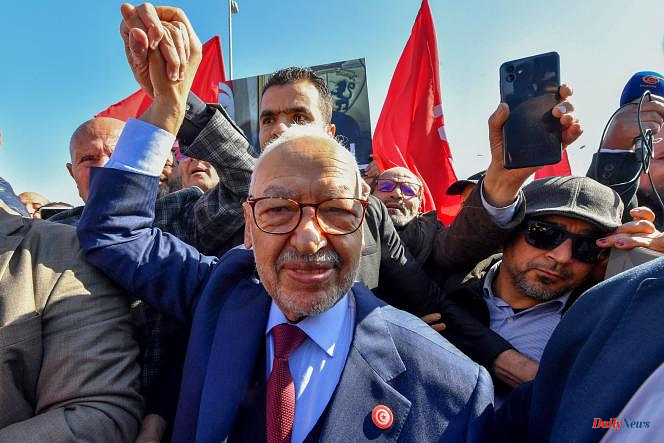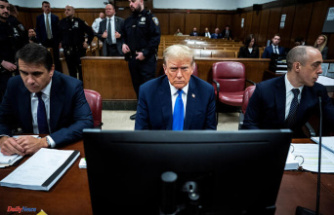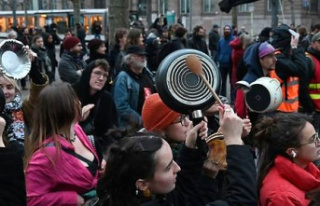The leader of the Tunisian Islamo-conservative Ennahda movement, Rached Ghannouchi, one of the main opponents of President Kaïs Saïed, accused of authoritarian drift, was arrested on Monday April 17 at his home, his training announced.
Mr. Ghannouchi, 81, who led the Parliament dissolved in July 2021 by Mr. Saïed, is the most prominent opponent to be arrested since this coup.
"Ennahda denounces this extremely serious development and calls for the immediate release of Rached Ghannouchi," the movement pleaded in a statement. Tunisian authorities did not immediately comment on the arrest.
Ennahdha vice-president Mondher Lounissi told a press conference that Mr. Ghannouchi had been taken to a police barracks for questioning and that his lawyers had not been allowed to attend.
The arrest comes after statements reported by the media, in which Mr. Ghannouchi allegedly claimed this weekend that Tunisia would be threatened with a "civil war" if political Islam, from which his party originated, were eradicated there.
Mr. Ghannouchi's arrest took place at the time of iftar, the fast-breaking meal of Ramadan and hours before worshipers celebrate the holy night "of destiny".
Incarcerated opponents
Mr. Ghannouchi had appeared in February at the counter-terrorism judicial center following a complaint accusing him of having called the police “tyrants”. The opponent, President Saïed's pet peeve, was also heard in November 2022 by a judge from the counter-terrorism judicial center for a case related to the alleged dispatch of jihadists to Syria and Iraq.
In July of the same year, he was also questioned on suspicion of corruption and money laundering linked to the transfer of funds from abroad to a charity organization affiliated with Ennahda.
Since the beginning of February, the authorities have imprisoned more than twenty opponents and personalities including ex-ministers, businessmen and the boss of the most listened to station in the country, Mosaïque FM.
These arrests, denounced by local and international NGOs, targeted leading political figures of the National Salvation Front (FSN), the main opposition coalition of which Ennahda is a member.
"Blind Revenge"
President Saïed, who has taken full power since his July 2021 coup, called those arrested "terrorists", saying they were involved in a "conspiracy against state security".
"The arrest of the leader of the most important political party in the country, who has always shown his commitment to peaceful political action, marks a new phase in the crisis", reacted Monday evening to Agence France-Presse on President of the DSF, Ahmed Néjib Chebbi. "This is blind revenge against opponents," he added.
After his coup, Mr. Saïed had the Constitution revised to establish an ultra-presidentialized system at the expense of Parliament, which no longer has real powers, unlike the dissolved Assembly dominated by Ennahda.
A leading opponent under the regimes of Habib Bourguiba and Zine El-Abidine Ben Ali, Mr. Ghannouchi was celebrated by thousands on his return from London after twenty years of exile during the fall of the dictator in 2011. But his star has gradually faded since the revolution, his detractors accusing him of being a pragmatic maneuverer ready to do anything to stay in power.
Failing to be able to gather an absolute majority, he has always arranged for Ennahda to be essential in the various coalitions since the revolution. Even if it means making unnatural alliances with the liberal Qalb Tounes party of businessman Nabil Karoui, or with former President Beji Caid Essebsi, arguing the need for a "consensus" necessary for democratic transition.
At the beginning of his career, he was first inspired by the Egyptian Muslim Brotherhood, before claiming the Turkish Islamist model of Recep Tayyip Erdogan. He then turned Ennahda into a civil movement, supposed since 2016 to be devoted only to politics, and has since appeared as a "Muslim democrat" defending conservative values without dogmatism.












